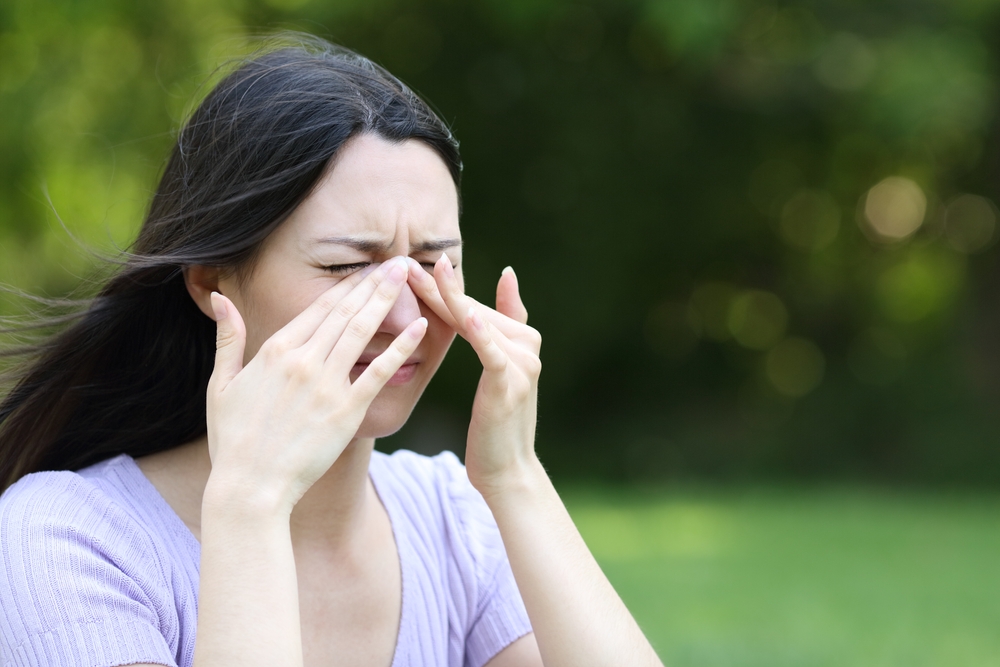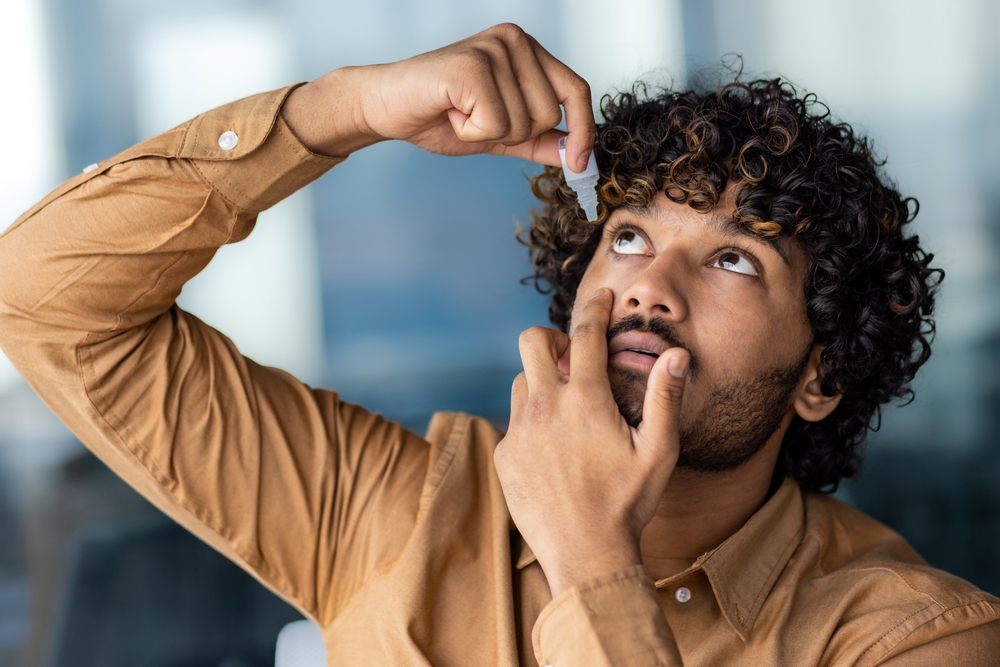Does Dry Eye Worsen with Cataracts?
Do you have blurred vision? Are your eyes dry? You may have dry eye and cataracts.
Many patients are affected by both conditions as they age. Cataracts and dry eye can cause vision problems and affect your day-to-day life.
Keep reading to learn if dry eyes can worsen with cataracts and the treatment options available.
What is Dry Eye?

Dry eye is a condition that occurs when your eyes don’t produce enough tears or make poor-quality tears that evaporate faster, meaning they cannot provide much-needed nutrients to the eyes. The symptoms of dry eyes usually affect both eyes, and can include:
- Redness
- Eye fatigue
- Poor night vision
- Sensitivity to light
- Blurred or double vision
- A burning or stinging feeling
- Stringy mucus around or in the eyes
- Watery eyes, which is the body’s response to dry, irritated eyes
- A gritty or scratchy sensation, like something’s in the eyes
What are Cataracts?
Cataracts form when proteins break down and build up in the eye’s natural lens, making it cloudy or foggy. Early on, cataracts affect only a small part of your lens, so you may not notice any vision changes.
But as the cataract grows larger and diminishes more of your lens, you may experience the following symptoms:
- Halos and glare
- Poor night vision
- Sensitivity to light
- Double vision in one eye
- Blurred or clouded vision
- Yellowing or fading of colors
- Frequent prescription changes
- Need for brighter light for close-up tasks
Do Dry Eyes Worsen with Cataracts?
Both cataracts and dry eye can coexist and become far more common with age. Although cataracts don’t worsen dry eye, cataract surgery can cause or exacerbate symptoms.
What are the Treatment Options for Dry Eyes and Cataracts?
The treatment methods for dry eye and cataracts are different. For dry eyes, your ophthalmologist will determine the root cause and severity of your condition.
This will allow them to provide the best treatment option to alleviate dry eye and bring lasting relief. Treatment options for dry eye at Desert Vision Center include:
Prescription Eye Drops

Prescription drops such as Restasis can stimulate tear production, alleviating dry eye symptoms.
LipiFlow
LipiFlow is a treatment designed to address one of the leading causes of dry eye: meibomian gland dysfunction (MGD). MGD causes obstructions in the meibomian glands, which prevents them from secreting adequate oil.
The oily layer of the tear film keeps your eyes from drying out. LipiFlow applies precise heat and massage to the inner and outer eyelids simultaneously.
Using heat and massage helps to clear blockages in the meibomian glands. Unclogging blocked glands allows oils to flow freely, reducing the fast evaporation of tears and providing lasting relief from dry eyes.
Intense Pulsed Light (IPL)
Intense pulsed light is a treatment that targets meibomian gland dysfunction. Meibomian gland dysfunction occurs when the meibomian glands are blocked or inflamed.
Patients with ocular rosacea have dilated vessels along the eyelid margins. These abnormal vessels increase eyelid inflammation and may cause meibomian gland dysfunction.
IPL delivers short bursts of light in specific wavelengths to heat the skin around the meibomian glands. The heat opens these glands by melting obstructions, increasing oil production.
The oily layer is vital for healthy eyes. Tears containing an oily layer evaporate slowly, relieving dry eyes.
At the same time, IPL closes off abnormally dilated blood vessels, reducing inflammation and giving you relief from dry eye.
BlephEx
BlephEx is a painless in-office procedure performed at Desert Vision Center. It uses a medical-grade microsponge to exfoliate and remove any biofilm, debris, and particles clinging to the surface of the meibomian glands and eyelid margin.
The procedure only takes 6-8 minutes to complete, and may be repeated after 3-6 months.
Biological Therapies
If you have severely dry eyes that haven’t responded to traditional treatments, your Desert Vision Center ophthalmologist may recommend biological therapies. These may include amniotic membrane graft therapy and autologous serum eye drops.
Cataract Surgery
Your ophthalmologist will recommend cataract surgery once poor vision from cataracts interferes with your everyday life. Cataract surgery is the only effective treatment for cataracts and regaining the ability to see clearly.
Cataract surgery involves removing the cloudy lens caused by a cataract and implanting a synthetic intraocular lens (IOL) to restore clear vision.
What Causes Dry Eye After Cataract Surgery?
There are various reasons why dry eyes often develop after cataract surgery, including:
Pre-Existing Dry Eye
Ophthalmologists try to diagnose and treat dry eyes before patients undergo cataract surgery. However, dry eyes can still go undetected before cataract surgery. As a result, dry eye symptoms may worsen after the procedure.
Corneal Nerve Damage
The incision created during cataract surgery can temporarily damage corneal nerves, which are essential for tear production. Damage to the corneal nerves can reduce tear production, causing irritation, discomfort, visual disturbances, and other symptoms of dry eyes.
Disruption of the Tear Film
The incision created during cataract surgery can also cause the tear film to break up or evaporate more easily. The tear film lubricates your eyes. A disruption of the tear film can lead to dry eyes.
Prescription Eye Drops
After surgery, you’ll need to use prescribed eye drops to prevent infection and reduce chances of inflammation. These can include steroid and antibiotic drops. However, the preservatives and ingredients in these eye drops can irritate and dry out your eyes.
Inflammation
Cataract surgery can trigger inflammation. Inflammation is a normal response that may decrease tear production, causing or aggravating dry eyes.
Why Should You Address Dry Eye Before Cataract Surgery?
It’s crucial to receive dry eye treatment before cataract surgery. There are several reasons for this, including:
Prevent Dry Eye from Worsening
Getting dry eyes under control before cataract surgery can help prevent more severe symptoms after the procedure.
Achieve Your Best Vision

Dry eyes can cause symptoms such as fluctuating vision and blurred or double vision, which can persist after the procedure. Addressing dry eyes before cataract surgery increases your chances of achieving sharp, clear, and stable vision.
Correct IOL Calculations
Vision fluctuations, a dry eye surface, or irregular tear film due to dry eyes can lead to incorrect IOL power calculations. Consequently, you could have residual refractive errors, including astigmatism, presbyopia, nearsightedness, and farsightedness.
Addressing dry eyes before cataract surgery will ensure accurate IOL measurements, which is essential in meeting your visual goals after undergoing cataract surgery.
Effective, Long-Term Dry Eye and Cataract Treatment
Dr. Tokuhara from Desert Vision Center can help with dry eye and cataracts. He’ll use the most effective and state-of-the-art treatments to treat dry eyes and recommend cataract surgery once cataracts start interfering with your day-to-day activities.
Do you have dry eyes and cataracts? Schedule your appointment today at Desert Vision Center in Rancho Mirage, CA, to find lasting relief and maintain clear, healthy vision.

